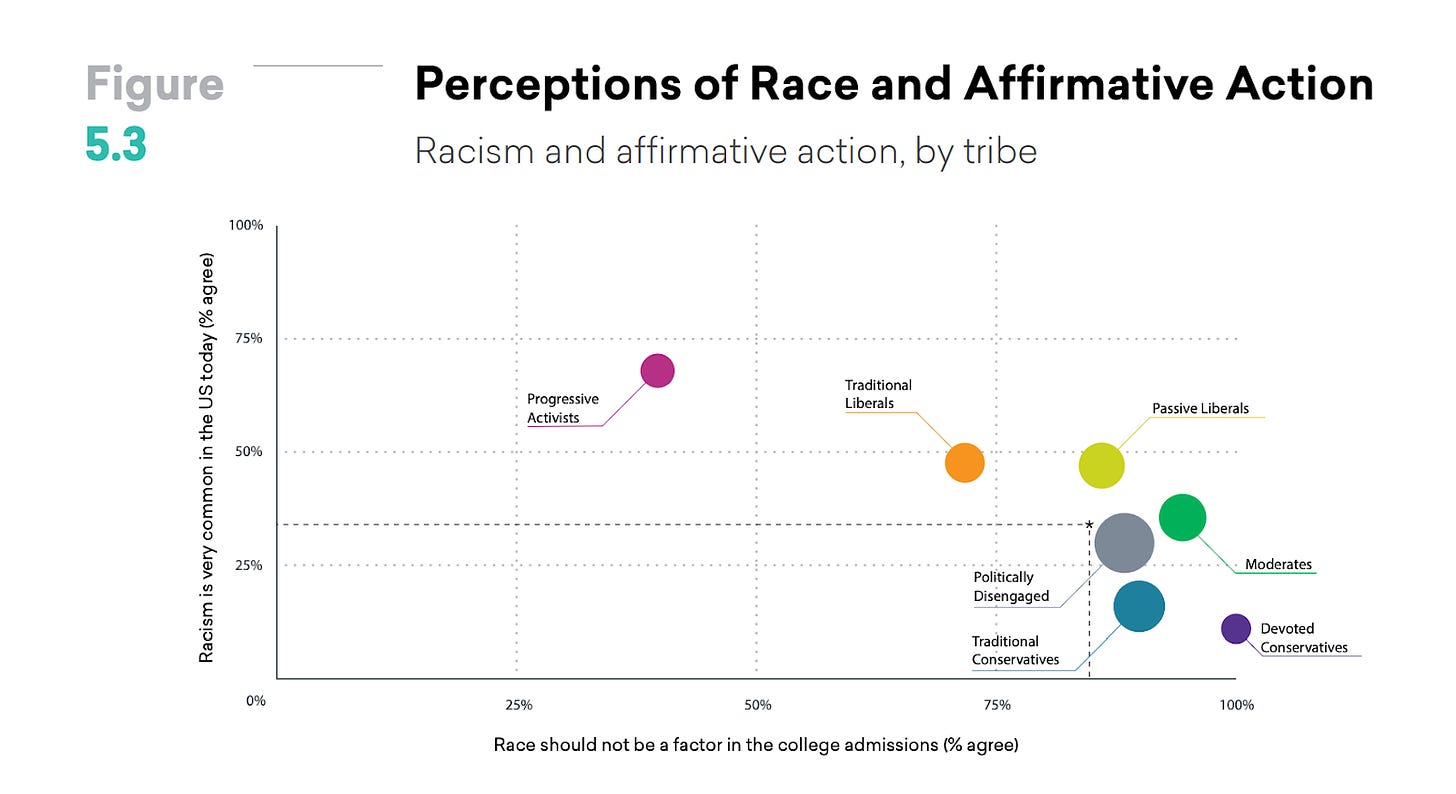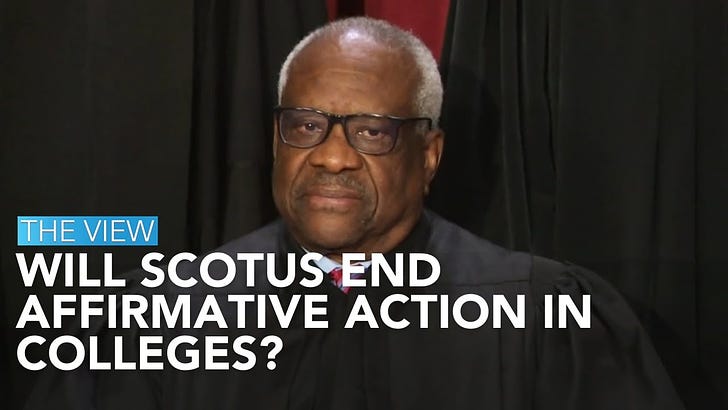Sorry NBC and The View, Most Minorities Oppose Racial Preferences
Expect more media flimflam after the Supreme Court rules on affirmative action
If you want to fight groupthink in entertainment and media, please consider supporting Shiny Herd by becoming a free subscriber or making a pledge.
We can expect the Supreme Court to outlaw affirmative action by the end of the month. And if that happens, we can expect something else—journalists will declare it to be a blow to minorities.
The biggest names in media often frame the issue as “white versus nonwhite,” and the Asians who complicate that narrative can be diminished as pawns in a conservative dark money plot.
From daytime gabbers to late night jokers, the “white versus nonwhite” framing continues into the world of infotainment.
But the rarely uttered truth is that, no matter their hue, Americans largely agree about affirmative action. Majorities of all races oppose racial preferences.
It’s a reality that those in media and entertainment often obscure.
Consider NBC News and The View.
Both outlets recently touted a survey that found that 69% of Asian American registered voters support affirmative action. It was big news because the group so often hurt by affirmative action appeared to stand firmly behind the policy.
But the Manhattan Institute's Renu Mukherjee revealed the hidden story behind that widely-discussed finding.
AAIP Data, the polling organization that conducted the survey, noted that respondents’ support for affirmative action varies depending upon how questions are phrased.
Here’s the question that was favored by 69% of Asians: “Do you favor or oppose affirmative action programs designed to help black people, women, and other minorities get better access to higher education?”
Past AAIP surveys included different phrasing: “In general, do you think affirmative action programs designed to increase the number of Black and minority students on college campuses are a good thing or a bad thing?”
That version of the question generated lower support for affirmative action, so the AAIP simply ditched the phrasing in their more recent surveys.
Of course, what AAIP staffers admitted was already widely known among pollsters—phrasing matters. It matters a lot.
Want to show widespread support for affirmative action? Keep your questions nice and vague.
Strong majorities of all races support affirmative action when confronted with questions like, “Do you generally favor or oppose affirmative action programs for racial minorities?”
That kind of phrasing leaves plenty of room for uncontroversial programs like minority outreach.
But look what happens when pollsters zero in on what the Supreme Court case is really about—racial preferences.
When a 2022 Pew Research poll asked if “race or ethnicity should be a factor in college admissions,” 63% of Asians said no. Majorities of other races said no as well—black (59%), Hispanic (68%), and white (79%).
A 2022 YouGov survey found similar results when pollsters asked if “qualified minorities should be given special preferences in higher education.” Black respondents said no (52%), as did Hispanic (66%) and white respondents (76%). (Asians weren’t polled.)
A slightly older FiveThirtyEight poll asked black people “whether black Americans should be given preferential treatment in hiring and promoting decisions.”
A slim majority (51%) opposed that policy, and the poll was released during a tumultuous time (October 2020) when observers might expect especially strong support for racial preferences among black respondents.
I was unable to identify any recent survey by a major polling organization that found majority support for racial preferences among any racial group. (If you find one, let me know.)
But let’s try a different route—what are we to make of high-profile ballot initiatives?
Californians voted against racial preferences in 1996 when they passed Prop 209, and an even bluer electorate shot down racial preferences again in 2020 when the Golden State rejected Prop 16.
A pre-election PPIC poll found that only 34% of whites and 37% of Latinos planned to vote for Prop 16.
Aha! But 51% “in other racial/ethnic groups” said they would vote yes on Proposition 16.
The poll doesn’t break the numbers down any further, so we don’t know how, say, the black or Asian vote shook out. (Although UCLA’s Natalie Masuoka sees evidence from county-by-county data that Asians largely voted against the initiative.)
The pro-preferences crowd might say the result reveals at least one instance when a majority of some minorities supported racial preferences.
Then again, the pro-16 forces outspent their opponents 25 to 1. What might the result have been if spending hadn’t been so lopsided?
And the language slapped on California ballot initiatives is notoriously confusing.
What would you make of Prop 16’s official title: “The Allows Diversity as a Factor in Public Employment, Education, and Contracting Decisions. Legislative Constitutional Amendment”?
UCLA law professor Richard Sander notes that, “Someone reading the more detailed language that follows can figure out that Prop. 16 would allow the government to use racial and gender preferences, but it is not obvious.”
It seems we’ve returned to that old polling truism that phrasing matters a lot.
And Sander points out many truths about post 209 California that get little attention in the press. After an initial dip, black and Hispanic enrollment in the University of California system quickly reached new highs.
Graduation rates improved as well.
“The four-year graduation rate of underrepresented minorities in the UC system nearly doubled in the 10 years after Prop. 209’s adoption,” said Sander.
And after Prop 209, a much higher proportion of black and Hispanic grads were earning degrees in STEM fields.
Sander summarizes: “In short, within a few years of Prop. 209’s implementation, underrepresented minorities were flourishing at UC, in both absolute and relative terms, to a degree they never had before.”

But don’t expect to hear that kind of good news in the wake of the Supreme Court’s decision.
That’s because the group most wedded to racial preferences may be the one that delivers news and entertainment. The figure above shows how isolated the “progressive activist” tribe is, even from other left leaners.
America’s most progressive tribe also happens to be its most culturally powerful.
Journalists, producers, and on-air talent try to bend reality so readers and viewers think what progressives think is synonymous with what minorities think.
How long can such a big, politically diverse nation maintain that fiction?
Ted Balaker is a filmmaker, and former network newser and think tanker. His recent work includes Little Pink House starring Catherine Keener and Jeanne Tripplehorn, Can We Take a Joke? featuring Gilbert Gottfried and Penn Jillette, and a soon-to-be-released feature documentary based on the bestselling book, The Coddling of the American Mind, by Greg Lukianoff and Jonathan Haidt.





Every day, Democrats attack Asians in the city streets and school boards. Never forget that they are the main source of Asian hate: https://yuribezmenov.substack.com/p/how-to-stop-asian-hate